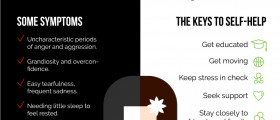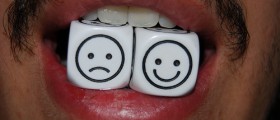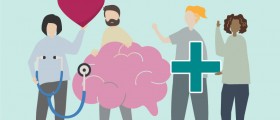
Manic depression
This condition, also called bipolar disorder, represents the change of the mood from the low or depressed, to the high or manic. Bipolar is the name given because of the two poles, the high and low. This condition is created due to the brain that alters the functioning ability, energy and mood of an individual, and it is not picky, since it equally affects both sexes and it can develop in any age, though it often begins in the age of adolescence. Some studies show that this condition may run in the family. Manic depression is dangerous for the ones who suffer from it, but it can also be dangerous and discomforting for the surrounding, especially for the family.
Diagnosis and treatment
The most common stages of the manic depression are depressive, manic and mixed episodes, which we are about to explain. These three states are used for diagnosing the problem. Manic is when elevated mood happens with three or more episodes during one day, for one week or longer, while depressive is when 5 or more happen during an entire day for two weeks. Mixed episode is the combination of these two happening together. Some activities can trigger the episodes, so it is important to see and learn which they are, because that way you can eliminate them and reduce the number of the episodes.
There are several possible ways of treating this problem. The first is by the use of medications called mood stabilizers. Most commonly used are valproate or lithium, but the use of antidepressants can also be helpful with the mood changes. Thyroid function is usually abnormal in these cases, so it is a good idea to monitor it.
Symptoms
We have mentioned the low and high stages. The most common symptoms associated with the manic episode are increased energy, distractibility, euphoric mood, restlessness, little sleep, sex drive increase, poor judgment, irritability, aggressive behavior, spending sprees, unrealistic beliefs, drug abuse, denial of wrong, etc.
Depressive episode causes empty mood, loss of interest, too much sleeping, energy decrease, guilt, hopelessness, pessimism, concentration problems, chronic pain caused by no injury, suicide ideas, and appetite change. Psychosis is a severe episode that involves hallucinations and delusions. Some confuse it with schizophrenia. Hypomania is a mild episode that has to be treated, because otherwise it can lead to severe depression or mania. The mixed stage causes agitation, psychosis, suicide ideas, appetite change, sad and hopeless mood and sleeping troubles.

















Your thoughts on this
Loading...